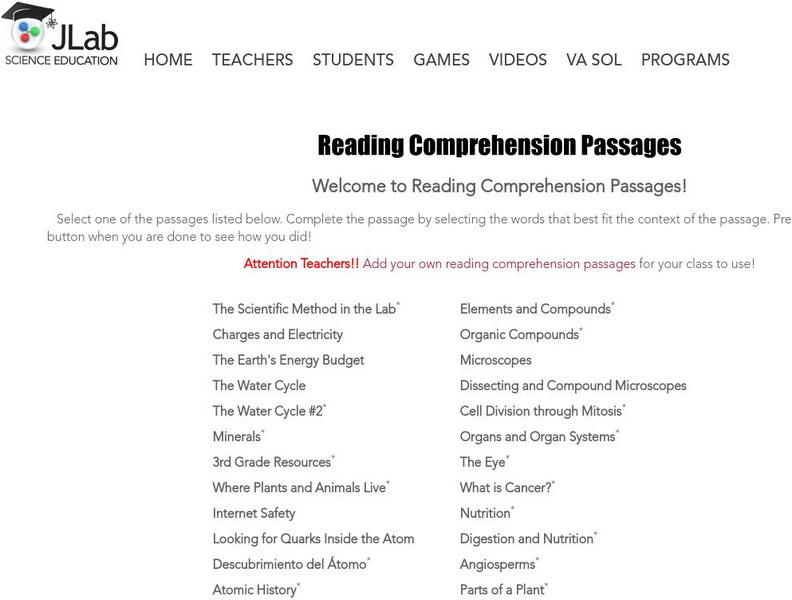Other
Le Moyne College:elements & Atoms, Indivisible No Longer
Click to read different historical documents in chemistry related to the history of the study and discovery of radioactivity.
Ducksters
Ducksters: Chemistry for Kids: Elements: Neon
Discover the properties and characteristics of neon on this site.
Khan Academy
Khan Academy: Biology: Chemistry of Life: Atomic Number,atomic Mass,and Isotopes
Learn the fundamental properties of atoms in this article. Understand the definition of atomic number, atomic mass, and isotopes. [6 min, 50 sec]
Ducksters
Ducksters: Chemistry for Kids: Chemical Bonding
Study chemical bonding in chemistry including atoms, valence electrons, ionic and covalent bonding, and how molecules are formed on this site!
Ducksters
Ducksters: Chemistry for Kids: Famous Chemists
Get some information about some famous chemists who made impacts on their fields! These scientists helped to develop the laws of chemistry and discovered many of the elements.
Ducksters
Ducksters: Chemistry for Kids: Naming Chemical Compounds
Learn about naming chemical compounds in chemistry including conventions, the order of the elements, metals, non-metals, acids, and examples on naming on this site.
Ducksters
Ducksters: Chemistry for Kids: Radioactivity and Radiation
Kids learn about the science of radioactivity and radiation in chemistry including radioactive decay, types, measurements, half-life, and the dangers.
Ducksters
Ducksters: Chemistry for Kids: Isotopes
Study the science of isotopes in chemistry including naming isotopes, hydrogen, examples, fun facts, unstable, and stable on this site.
American Chemical Society
Middle School Chemistry: Periodic Table and Energy Level Models
Students interpret the information given in the periodic table to describe the arrangement of electrons on the energy levels around an atom.
Georgia Department of Education
Ga Virtual Learning: Ap Chemistry: Welcome
An introduction to the College Board's AP Chemistry course, which is designed to be equivalent to a first year college chemistry course.
American Chemical Society
American Chemical Society: Hompage
ChemCenter, available from the American Chemical Society, provides chemistry news, reference sources and other public services.
Science Struck
Science Struck: Explanation of John Dalton's Atomic Theory
Explains the basic tenets of Dalton's atomic theory.
Khan Academy
Khan Academy: Practice Writing Electron Configurations
Choose the element that matches the electron configuration.
Thomas Jefferson National Accelerator Facility
Jefferson Lab: Reading Comprehension Passages
Thirty-three cloze reading passages on various scientific passages including the scientific method, the water cycle, earth science, atoms, elements, cell division, body systems, and more.
Ducksters
Ducksters: Chemistry for Kids: Organic Chemistry
Kids learn about organic chemistry including the importance of carbon, organic molecules, compounds, hydrocarbons, synthesis, and functional groups.
Ducksters
Ducksters: Chemistry for Kids: Chemical Mixtures
Explore all about chemical mixtures on this site including solutions, alloys, suspensions, colloids, dissolving, examples, and facts.
Ducksters
Ducksters: Chemistry for Kids: Soaps and Salts
Kids learn about soaps and salts in chemistry including interesting facts, how soap is made, how soap works, and what are salts in this site.
Ducksters
Ducksters: Chemistry for Kids: Solutions and Dissolving
On this site, students learn about solutions and dissolving in chemistry including interesting facts, examples, solubility, saturation, concentration, and what is a solution?
Ducksters
Ducksters: Chemistry for Kids: Separating Mixtures
Kids learn about separating mixtures in chemistry including separation processes such as filtration, distillation, and the centrifuge.
Ducksters
Ducksters: Chemistry for Kids: Chemical Reactions
A site discussing chemical reactions in chemistry including reaction rate, types of reactions, reagents, reactants, catalysts, and inhibitors.
PBS
Pbs Learning Media: Meaning of Matter
Matter is all around us, so it's a good idea to know what it is, and why it matters. Learn about matter, its categories, and its subcategories with this interactive lesson.
Alabama Learning Exchange
Alex: Emission Spectrum
We will reintroduce the students to the electromagnetic spectrum and visible light. We will talk about the states of electrons(ground and excited). The teacher will show a video link (Electrons in Atoms). We will then perform the science...
ClassFlow
Class Flow: Comparing and Contrasting Matter
[Free Registration/Login Required] This flipchart is a guided activity to help students compare different types of matter: atoms and molecules, elements and compounds, mixtures and solutions. It corresponds to Virginia science SOL 5.4.






















